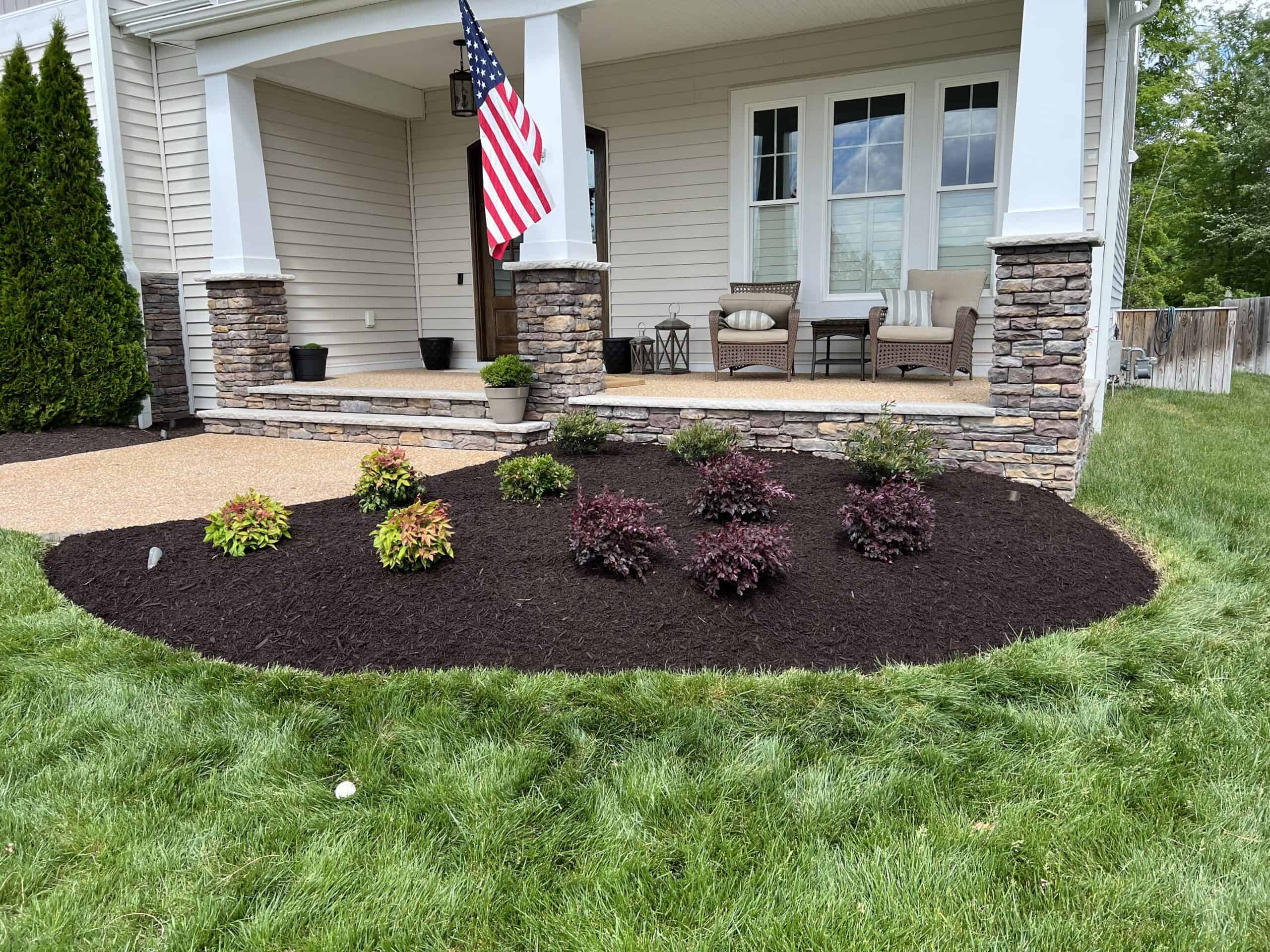How important is mulching in landscaping, and does it matter which kind you choose? Maintaining a thriving lawn in Virginia means managing ever-changing climate conditions and caring for your property with frequent mowing and weed control. Therefore, appropriate mulching methods are essential for effortless weather transitions.
This blog will discuss seasonal mulching facts and provide tips for VA homeowners. Consistent lawn care can be challenging, but it's also a rewarding endeavor that could boost your property value and enhance outdoor living spaces. Let's explore what else you should know.
 Mulching Is Not a One-Size-Fits-All Lawn Fix
Although beautiful mulching can improve curb appeal by defining sections and accentuating hardscapes, it is not an umbrella solution for lawn problems. Professionally installed mulch reduces weed growth, conserves natural moisture, and nourishes plant roots with essential nutrients. But homeowners must establish a healthy foundation to avoid repetitive issues.
Meanwhile, outdoor conditions, debris, and animal activity can overwhelm even the best mulch. Occasional mulching amendments and soil assessments help keep your lawn green and growing. Schedule seasonal yard cleanups to maintain critical areas and promote a lush landscape.
Consider weather variables, plant needs, and local terrain to develop a landscaping plan. Discuss the options with your lawn maintenance team, including tips for keeping your property clean during heavy rains, winds, and harsh conditions.
Pro Tips for Mulching Lawns in VA
Local landscaping professionals know the challenges you face while maintaining a property in VA. They also understand the appropriate time for mulch installs to maximize soil moisture, suppress weeds, and optimize ground temperatures. Many will wait until the dirt is warm and dry (late March/early April), and then they will aerate the surrounding soil to ensure robust growth and solid borders.
Applying mulch too soon in the season can delay seed germination and hinder landscaping development. Also, choosing the wrong mulching type may compromise soil health and invite pests. Consult landscapers in Virginia about cost-effective solutions, such as using shredded leaves, grass clippings after mowing, and DIY compost.
Seasonal Mulching Considerations
Each season requires a different lawn care approach. Let's examine best practices for summer, fall, winter, and spring, then check out some pro tips to help your yard reach its full potential.
Summer
Beat the heat and reduce water consumption with seasonal mulching to maximize resources. Reduce moisture evaporation, protect crucial plant roots, and deter unwanted wildlife while improving your lawn's look. Shield landscaping and hardscapes structures from extreme temperatures with organic mulch and frequent lawn maintenance.
PRO TIP: Inspect mulch beds monthly and immediately after heavy rainfall. Fluff it to prevent compaction and add layers throughout the summer as needed.
Fall
Prepare for the colder months and insulate flower beds with mulching around the garden. Fall means adding extra layers to guard sensitive perennials from temperature fluctuations, drought-like conditions, and frost heaving. Mulching can also help distribute nutrients to struggling yard sections.
PRO TIP: Use heavy mulching to ensure adequate insulation against freezing temperatures. Apply more mulch after the first frost and regularly monitor its condition.
Winter
Give your delicate landscaping a fighting chance in the winter with ample mulching and natural wind guards. Build mulch beds with seasonal plants, then install and trim shrubs to produce organic barriers. Apply more mulch around vegetation prone to frostbite, and avoid mixing too often because it allows crucial heat to escape.
PRO TIP: Avoid mulch compaction using loose materials like straw or pine needles. Ensure proper air circulation by hiring lawn care specialists with training and equipment.
Spring
Get creative during the springtime with custom mulch installations, new plants, and tailored pruning. Select mulching types that can withstand heavy spring rains and variable weather conditions. Then use a proprietary blend of leaves, grass, straw, and composting to enrich the soil before the sweltering summer.
PRO TIP: Swap high-cost mulch for gravel, stone, or hardscaping to save time maintaining your lawn. Then schedule aeration/overseeding early to build a solid foundation for seasonal landscaping.
Mulching Is Not a One-Size-Fits-All Lawn Fix
Although beautiful mulching can improve curb appeal by defining sections and accentuating hardscapes, it is not an umbrella solution for lawn problems. Professionally installed mulch reduces weed growth, conserves natural moisture, and nourishes plant roots with essential nutrients. But homeowners must establish a healthy foundation to avoid repetitive issues.
Meanwhile, outdoor conditions, debris, and animal activity can overwhelm even the best mulch. Occasional mulching amendments and soil assessments help keep your lawn green and growing. Schedule seasonal yard cleanups to maintain critical areas and promote a lush landscape.
Consider weather variables, plant needs, and local terrain to develop a landscaping plan. Discuss the options with your lawn maintenance team, including tips for keeping your property clean during heavy rains, winds, and harsh conditions.
Pro Tips for Mulching Lawns in VA
Local landscaping professionals know the challenges you face while maintaining a property in VA. They also understand the appropriate time for mulch installs to maximize soil moisture, suppress weeds, and optimize ground temperatures. Many will wait until the dirt is warm and dry (late March/early April), and then they will aerate the surrounding soil to ensure robust growth and solid borders.
Applying mulch too soon in the season can delay seed germination and hinder landscaping development. Also, choosing the wrong mulching type may compromise soil health and invite pests. Consult landscapers in Virginia about cost-effective solutions, such as using shredded leaves, grass clippings after mowing, and DIY compost.
Seasonal Mulching Considerations
Each season requires a different lawn care approach. Let's examine best practices for summer, fall, winter, and spring, then check out some pro tips to help your yard reach its full potential.
Summer
Beat the heat and reduce water consumption with seasonal mulching to maximize resources. Reduce moisture evaporation, protect crucial plant roots, and deter unwanted wildlife while improving your lawn's look. Shield landscaping and hardscapes structures from extreme temperatures with organic mulch and frequent lawn maintenance.
PRO TIP: Inspect mulch beds monthly and immediately after heavy rainfall. Fluff it to prevent compaction and add layers throughout the summer as needed.
Fall
Prepare for the colder months and insulate flower beds with mulching around the garden. Fall means adding extra layers to guard sensitive perennials from temperature fluctuations, drought-like conditions, and frost heaving. Mulching can also help distribute nutrients to struggling yard sections.
PRO TIP: Use heavy mulching to ensure adequate insulation against freezing temperatures. Apply more mulch after the first frost and regularly monitor its condition.
Winter
Give your delicate landscaping a fighting chance in the winter with ample mulching and natural wind guards. Build mulch beds with seasonal plants, then install and trim shrubs to produce organic barriers. Apply more mulch around vegetation prone to frostbite, and avoid mixing too often because it allows crucial heat to escape.
PRO TIP: Avoid mulch compaction using loose materials like straw or pine needles. Ensure proper air circulation by hiring lawn care specialists with training and equipment.
Spring
Get creative during the springtime with custom mulch installations, new plants, and tailored pruning. Select mulching types that can withstand heavy spring rains and variable weather conditions. Then use a proprietary blend of leaves, grass, straw, and composting to enrich the soil before the sweltering summer.
PRO TIP: Swap high-cost mulch for gravel, stone, or hardscaping to save time maintaining your lawn. Then schedule aeration/overseeding early to build a solid foundation for seasonal landscaping.
 More Mulching Hacks for Virginia Homes
Maximize mulch like this:
More Mulching Hacks for Virginia Homes
Maximize mulch like this:
- Mind the thickness.
- Make it 2-4 inches and adjust per season.
- Keep mulch away from plant roots and stems.
- Check for root rot and lawn diseases in spring and fall.
- Inspect your property and monitor soil conditions.
- Replace or replenish mulching as necessary to maintain quality and thickness.
- Avoid making mulch volcanoes by piling too much against plant bases and hardscaping.
- Spread mulching evenly around flow beds and borders to prevent heaps and valleys.
 info@ekglawn.com
info@ekglawn.com